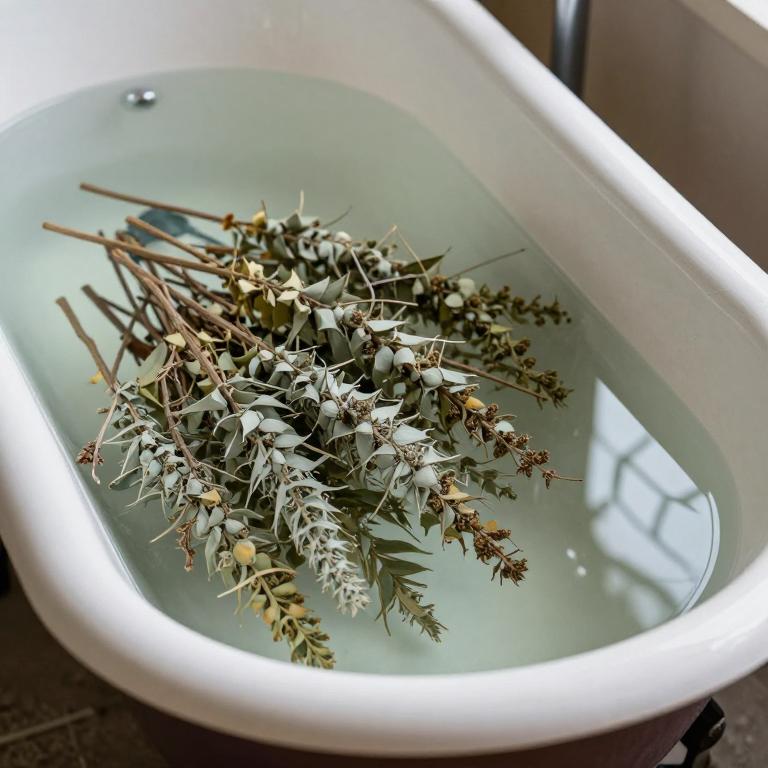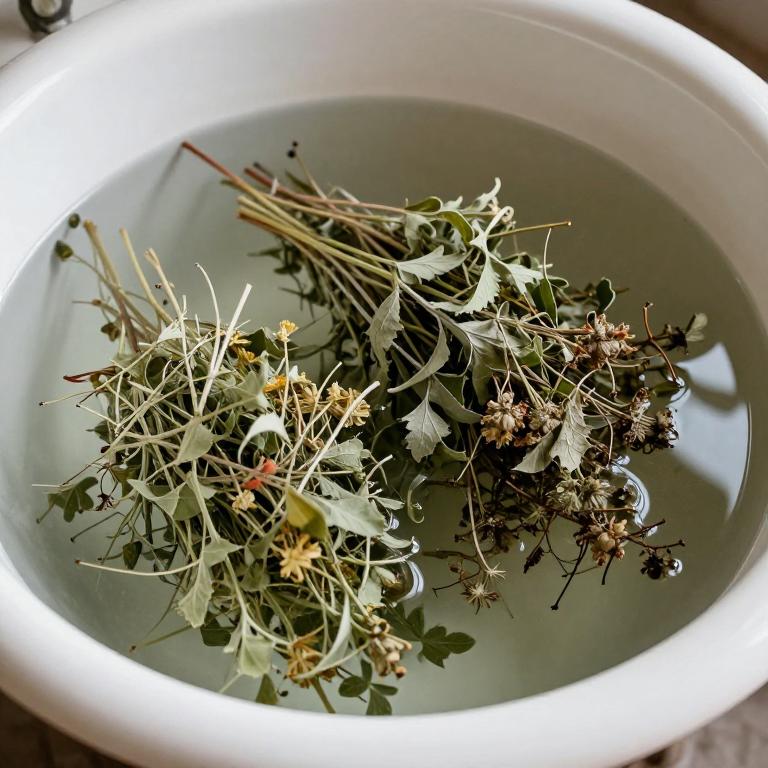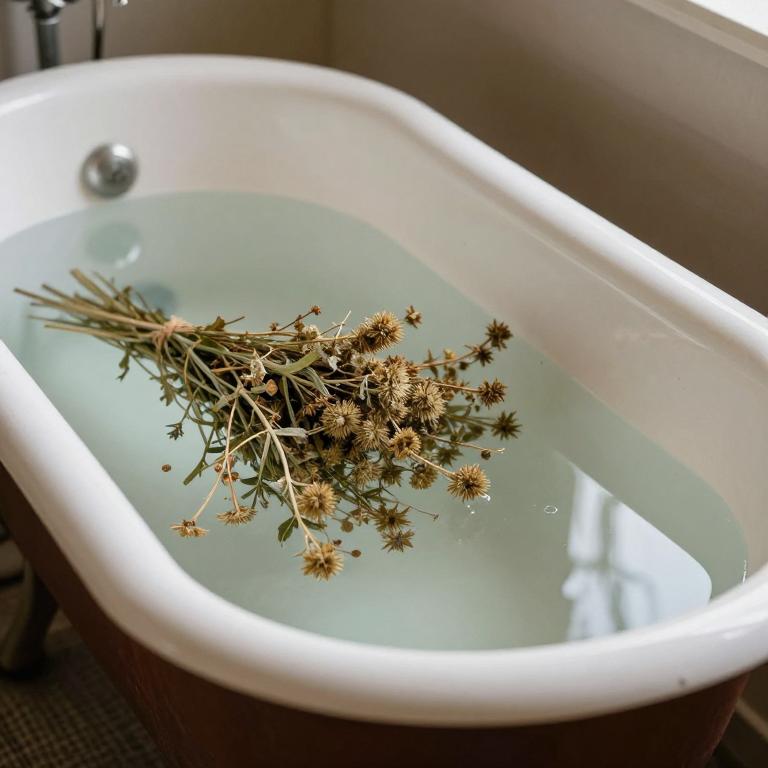10 Best Herbal Baths For Inflammation

Herbal baths have long been used as a natural remedy to reduce inflammation and promote relaxation.
Certain herbs such as chamomile, lavender, and eucalyptus are known for their anti-inflammatory and soothing properties. When added to warm water, these herbs can help ease muscle pain, joint stiffness, and skin irritation. A regular herbal bath can also enhance circulation and support the body's natural healing processes.
For best results, it is recommended to soak for 15 to 30 minutes and use fresh, high-quality herbs for maximum effectiveness.
Table of Contents
- 1. St. john's wort (Hypericum perforatum)
- 2. Stinging nettle (Urtica dioica)
- 3. Field horsetail (Equisetum arvense)
- 4. Cancer bush (Sutherlandia frutescens)
- 5. English lavender (Lavandula angustifolia)
- 6. Yarrow (Achillea millefolium)
- 7. Salvia (Salvia officinalis)
- 8. Common mallow (Symphytum officinale)
- 9. Blessed thistle (Cnicus benedictus)
- 10. Thyme (Thymus vulgaris)
1. St. john's wort (Hypericum perforatum)

Hypericum perforatum, commonly known as St. John's Wort, has been traditionally used in herbal baths to alleviate inflammation due to its anti-inflammatory and analgesic properties.
When infused into bath water, the active compounds such as hypericin and hyperforin may help reduce redness, swelling, and discomfort associated with skin conditions or musculoskeletal inflammation. The warm water enhances the absorption of these compounds through the skin, promoting a soothing effect on inflamed areas. Herbal baths with St. John's Wort are often recommended for conditions like eczema, psoriasis, or arthritis-related joint pain.
However, individuals should consult a healthcare provider before using St. John's Wort, as it may interact with certain medications.
2. Stinging nettle (Urtica dioica)

Urtica dioica, commonly known as stinging nettle, has been traditionally used in herbal baths to alleviate inflammation due to its high concentration of anti-inflammatory compounds such as flavonoids and omega-3 fatty acids.
When steeped in hot water and used in a bath, the plant's leaves release minerals like calcium and magnesium, which can help soothe irritated skin and reduce redness. The antihistamine properties of nettle may also help ease allergic reactions and skin conditions like eczema or psoriasis. Regular use of a stinging nettle bath can promote circulation and ease joint pain associated with conditions like arthritis.
However, it is important to ensure the plant is properly prepared and to perform a patch test to avoid any skin irritation or allergic reaction.
3. Field horsetail (Equisetum arvense)

Equisetum arvense, commonly known as field horsetail, has been traditionally used in herbal baths to alleviate inflammation due to its high concentration of silica and other anti-inflammatory compounds.
The silica content in horsetail helps strengthen connective tissues and may reduce swelling in conditions like arthritis or muscle strain. When used in a warm bath, the compounds are absorbed through the skin, providing a soothing effect on inflamed areas. Herbal baths with Equisetum arvense are often recommended for their ability to promote circulation and ease joint pain.
However, it is important to consult a healthcare provider before using horsetail baths, especially for individuals with kidney conditions or those taking certain medications.
4. Cancer bush (Sutherlandia frutescens)

Sutherlandia frutescens, commonly known as cancer bush, is a South African herb traditionally used for its potential anti-inflammatory properties.
Herbal baths infused with Sutherlandia frutescens may help reduce inflammation by promoting circulation and soothing irritated tissues. The active compounds in the plant, such as sutherlandin and alkaloids, are believed to support the body's natural healing processes. When used in bath form, the herb can be absorbed through the skin, offering a holistic approach to managing inflammatory conditions.
However, it is important to consult a healthcare professional before using Sutherlandia frutescens baths, especially for individuals with chronic or severe inflammation.
5. English lavender (Lavandula angustifolia)

Lavandula angustifolia, commonly known as English lavender, is often used in herbal baths to help reduce inflammation due to its soothing and anti-inflammatory properties.
When infused into bath water, lavender essential oils or dried flowers can promote relaxation and ease discomfort associated with inflammatory conditions such as arthritis or muscle pain. The aromatic compounds in lavender interact with the skin’s receptors, potentially reducing inflammatory responses and promoting a calming effect. Regular use of lavender-infused baths may support overall skin health and provide relief from redness and swelling.
This natural remedy is a safe and accessible option for those seeking complementary therapy for inflammation.
6. Yarrow (Achillea millefolium)

Achillea millefolium, commonly known as yarrow, has been traditionally used in herbal baths to reduce inflammation and soothe skin irritations.
The plant contains compounds such as achilleine and azulene, which possess anti-inflammatory and analgesic properties. To prepare an herbal bath, dried yarrow leaves are steeped in hot water and then added to warm bathwater, allowing the active components to be absorbed through the skin. This method is particularly beneficial for conditions like eczema, psoriasis, and minor wounds.
Regular use of yarrow baths may help alleviate redness, swelling, and discomfort associated with inflammatory skin conditions.
7. Salvia (Salvia officinalis)

Salvia officinalis, commonly known as sage, has been traditionally used in herbal baths to help reduce inflammation due to its anti-inflammatory and antimicrobial properties.
When infused into bathwater, sage can soothe irritated skin and ease symptoms of conditions such as eczema, psoriasis, and minor burns. The essential oils in sage, particularly thujone and camphor, contribute to its therapeutic effects by promoting circulation and reducing swelling. Herbal baths with sage are also believed to have a calming effect, helping to relieve stress-related inflammation.
For best results, it is recommended to use a sage-infused bath for 15 to 20 minutes, allowing the skin to absorb the beneficial compounds gradually.
8. Common mallow (Symphytum officinale)

Symphytum officinale, commonly known as comfrey, has been traditionally used in herbal baths to alleviate inflammation and promote tissue repair.
When infused into warm water, comfrey's mucilage content helps soothe irritated skin and reduce swelling, making it beneficial for conditions like eczema or minor burns. The anti-inflammatory properties of symphytum officinale may also support joint health and ease muscle soreness when used in bath form. However, due to its potential toxicity if ingested, it is important to use comfrey baths externally and avoid prolonged exposure.
As with any herbal remedy, it is advisable to consult a healthcare professional before incorporating symphytum officinale into a treatment regimen.
9. Blessed thistle (Cnicus benedictus)

Cnicus benedictus, also known as blessed thistle, has been traditionally used in herbal baths to help reduce inflammation due to its anti-inflammatory and detoxifying properties.
When infused into bathwater, the compounds in blessed thistle may help soothe irritated skin and ease conditions such as eczema or psoriasis. The plant contains saponins and flavonoids, which are believed to contribute to its therapeutic effects by promoting circulation and reducing redness. Herbal baths with Cnicus benedictus are often recommended as a gentle, natural remedy for those seeking relief from mild inflammatory skin conditions.
However, it is important to consult with a healthcare professional before using it, especially for individuals with sensitive skin or existing medical conditions.
10. Thyme (Thymus vulgaris)

Thymus vulgaris, commonly known as thyme, has been traditionally used in herbal baths to alleviate inflammation due to its potent anti-inflammatory and antimicrobial properties.
When infused into warm water, thyme essential oils can help soothe irritated skin and reduce redness associated with conditions like eczema or psoriasis. The volatile compounds in thyme, such as thymol and carvacrol, work to penetrate the skin and provide a calming effect on inflamed tissues. Herbal baths with thyme are often recommended for their ability to promote relaxation and enhance the body's natural healing processes.
However, it is important to dilute thyme properly to avoid skin irritation, and individuals with sensitive skin should perform a patch test before using it in a full bath.